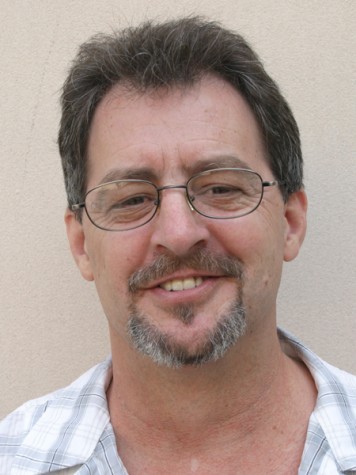This year marks the 40th anniversary of Earth day and GCC commemorated with a special presentation by Laura Faye Tenenbaum and Jeff Mendez about the effects of global warming and how to live more ‘green.’
The presentation, which took place in the packed lecture hall of CS 177, began with Tenenbaum showing a video she made showing stunning satellite images of fire, ice, water, and land on the Earth’s surface as seen from space.
“Space offers us a unique perspective,” said Tenenbaum.
Her enthusiasm for Earth was apparent throughout the presentation in the way she cheered after every mention of Earth day and even her announcement that, “Everyday should be Earth Day.”
Tenenbaum, an adjunct professor of oceanography and physical science, received a fellowship from GCC in 2007 to work with NASA and Jet Propulsion Laboratory (JPL) to develop a climate change course curriculum. In 2009 she received another fellowship to work with NASA and JPL to create educational materials for global climate courses.
She has also been very involved in developing an in-depth and interactive Web site at climate.nasa.gov, which she used to show the audience the Earth’s changing climate. This site has even been nominated for a Webby Award, which honors exceptional Internet sites.
Tenenbaum has been able to use her passion for the Earth by creating this Web site which combines two things she feels are very important: science and media.
She then continued the lecture with a “Mission to the Planet.”
“It begins with education,” said Tenenbaum. “We need more environmental literacy, environmental studies, and green careers and technology programs.”
Along with making changes to curriculum at GCC by adding more environmentally focused classes and programs, she also spoke about changes that need to happen on campus.
“The electricity bill at GCC has approached $1.8 million a year,” said Tenenbaum. “The campus will be participating in an energy efficiency audit from yesterday to Thursday, which is a big step for making changes.”
Tenenbaum also touched on the issue of trash on campus. “All the trash lying around the campus drives me crazy,” she said. “It’s just people being lazy. It makes me sick to my stomach.”
The problem of littering has had a large affect on the beaches of the world, said Tenenbaum. “Any beach where no one is paid to clean it up is covered in trash,” she said. “You may not see trash on beaches here because people clean it up. I’ve been to some pretty remote areas of the world and even those beaches have trash.”
Tenenbaum also advocated starting a community garden/urban greening project on campus which she suggested could be used by culinary students.
“We’ve done a lot so far,” said Tenenbaum. “But we’ve got a long way to go.”
At the end of her part of the presentation Tenenbaum introduced former GCC student, Nicholas Derian, who is now an intern at JPL where he has created a Facebook page for NASA climate change, which includes images, quizzes, important information and facts.
“The internship [at JPL] is absolutely amazing,” said Derian. “I even have my own office. [The internship] wasn’t that hard to get. You just have to show a lot of effort. The mentors I have are amazing to work with. It’s an overall awesome experience.”
The presentation then turned to physical science professor, Mendez, who has a fellowship at JPL analyzing climate change in the ocean.
“There are hundreds of instruments throughout the world streaming data,” said Mendez. “I put it into readable graphs and charts.”
He works with California Cooperative Oceanic Fisheries Investigations (CalCOFI) on the longest running oceanic time series. This basically means that for the past 60 years CalCOFI has been collecting data from the ocean, anything from currents to fish life and this data is now being translated and analyzed.
“Looking at 60 years of data got me thinking,” he said. “What have we done to the earth?”
He then spoke on what we can do next for the environment. “The average American uses 500 gallons of gasoline a year,” said Mendez. “Estimates show that we need to reduce our consumption by 90 percent. This means we should be using 50 gallons of gasoline a year.”
He also focused on changes such as using solar and wind energy, choosing to bike, walk or ride the bus instead of driving a car, buying more locally produced foods, and reusing what you can.
“Nothing that is disposable is more environmental then something that can be reused,” said Mendez. “Think. Don’t be green washed. You don’t need to buy ‘green’ products. If you do read the label and know what’s in them.”
The presentation ended the presentation with one final consideration. “Do you really care about the environment?” Mendez asked. “If you really do care that means that you will be willing to change your life.”
For more information on NASA Climate Change visit climate.nasa.gov or http://www.facebook.com/#!/pages/NASA-Climate-Change/353034908075?ref=ts.
To vote for NASA Climate Change for the Webby visit http://webby.aol.com/category_groups/society/categories/science/.

